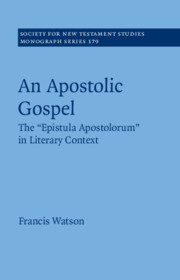Book contents
- An Apostolic Gospel
- Society for New Testament Studies
- An Apostolic Gospel
- Copyright page
- Contents
- Acknowledgements
- Introduction
- Part I Recovering the Epistula
- Part II Themes
- 3 The Miracle Sequence
- 4 Resurrection and Eschatologies
- 5 Narratives of Incarnation
- 6 Paul and the Apostolic Mission
- 7 Vindicating Divine Justice
- Part III Additional Notes on Text and Translation
- Appendix: The Galilean Discourse
- Bibliography
- Author Index
- Subject Index
4 - Resurrection and Eschatologies
from Part II - Themes
Published online by Cambridge University Press: 13 March 2021
- An Apostolic Gospel
- Society for New Testament Studies
- An Apostolic Gospel
- Copyright page
- Contents
- Acknowledgements
- Introduction
- Part I Recovering the Epistula
- Part II Themes
- 3 The Miracle Sequence
- 4 Resurrection and Eschatologies
- 5 Narratives of Incarnation
- 6 Paul and the Apostolic Mission
- 7 Vindicating Divine Justice
- Part III Additional Notes on Text and Translation
- Appendix: The Galilean Discourse
- Bibliography
- Author Index
- Subject Index
Summary
In the Epistula Apostolorum the retelling of the Easter story is closely related to the Johannine version (GJn 20), but with significant modifications. Here all of the disciples are initially disbelieving and require physical proof of the resurrection, not just Thomas; Mary Magdalene is accompanied to Jesus’ tomb by Mary and Martha of Bethany; and, once reunited with his disciples, Jesus is continually present with them in contrast to the episodic nature of canonical appearance stories. As in 1 Cor 15 but in contrast to the canonical gospels, EpAp views Jesus’ resurrection as paradigmatic of the future resurrection of the flesh. A comparison with the Treatise on the Resurrection brings to light unexpected convergences between these texts, in spite of the ‘proto-orthodox’ character of the one text and the alleged ‘gnostic’ tendencies of the other. The substantive difference is that TrRes understands resurrection soteriologically, as a reality that determines both the present and the future of the believer, whereas in EpAp resurrection is subordinated to the overriding emphasis on future judgement according to works.
Keywords
- Type
- Chapter
- Information
- An Apostolic GospelThe 'Epistula Apostolorum' in Literary Context, pp. 105 - 133Publisher: Cambridge University PressPrint publication year: 2020

